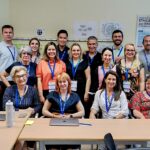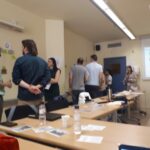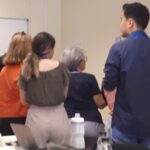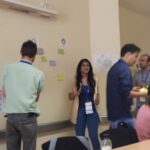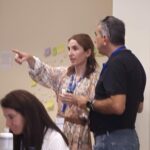Workshop programme
Once more, ESEA4RCIS is a community-based participatory workshop, so it has an unconventional format. We divide the programme into pre-workshop, workshop and post-workshop activities.
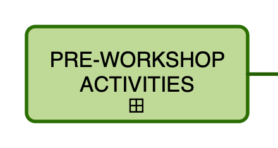
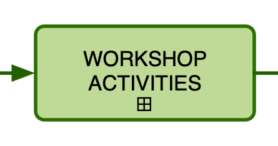
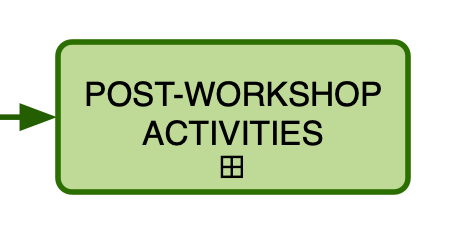
Pre-workshop activities
Before the RCIS workshop, we (the ESEA4RCIS organisers) have been doing a lot of prior research on ethical, social and environmental accounting (ESEA) in general, an on its possible application to conferences.
As a proof of concept, we have collected relevant information on earlier editions of RCIS, such as accepted papers and its authors, author affiliation, country/university/gender of all committees and chairs, etc.
This has allowed us to calculate meaningful indicators, such as gender ratios of authors and chairs; participation of developing countries through the years; evolution of the registration rates; relation of the conference themes and topics to ethical, social and environmental issues; etc. For instance:
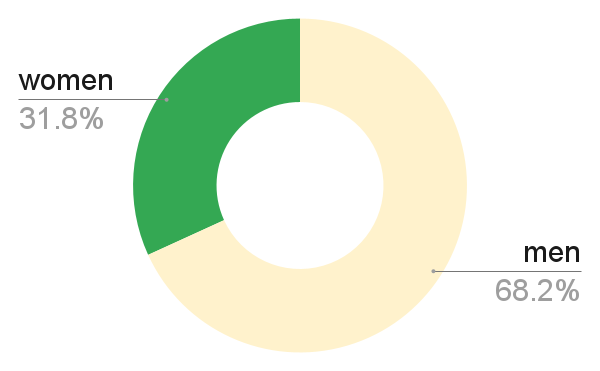
Gender ratio of general chairs across the 2007-2022 RCIS editions

Countries represented in the conference accepted papers, throughout the RCIS editions
But there are many more topics to assess, and many indicators can only be assessed while the conference takes place! We will do that collaboratively during the workshop.
Workshop activities
The workshop activities are as follows. Note that this is a draft that will be adapted to fit the requirements of the workshop or conference organisers, and the number of participants.
- 08:30. The welcome. We welcome attendees and conduct a warming up activity to activate the participants and provide them the context for the rest of the workshop. Participants can share what ethical, social and environmental topics resonate with them. This leads to initial discussions on the relevance of this workshop.
- 08:50. The scope and background. We state the goals and scope of the workshop (see some topics here), and the expected outcome (a co-authored scientific paper presenting the results). We ask the participants to provide feedback to the goals and scope, adjusting them if necessary. Then, we introduce the basic concepts of ethical, social and environmental accounting (ESEA).
- 09:10. The method. We present the method that we have engineered to perform the ESEA of RCIS. The method description is introduced through slides and also through a collection of post-its and posters. It consists of (i) a process model, (ii) a textual explanation of the activities and deliverables, (iii) a taxonomy of ESE topics in scope, and (iv) a list of indicators that allow assessing the performance on the topics, and are expressed as questions. We illustrate the topics and indicators with preliminary results based on our analysis of earlier conference editions. Participants get familiar with the method by discussing the topics and indicators.
- 10:00. Coffee break.
- 10:30. Method extension. We discuss potential adaptations and extensions to the method (i.e. new topics and indicators), depending on the sensitivities, research interests and expertise of the participants. This is done in a physically active way, walking around the room, picking and sticking post-its. We also present the supporting ICT infrastructure with consists of pre-configured spreadsheets and a draft survey.
- 11:00. Workgroups. We present the working groups. Each working group has a concrete goal and protocol, including what specific topics and indicators are within the scope of the working group, what data needs to be collected and how, and what ICT support should be used. We have defined 3 workgroups: WG1 aims at assessing the environmental sustainability of the conference, WG2 aims at assessing topics related to conference management and organisation, WG3 aims at collecting information from stakeholders of the conference through an online survey. The participants re-organise the indicator post-its, grouping them by workgroup. Participants select and join the workgroup of their preference. Additionally, all participants also belong to workgroup WG0, which will be discussed in the afternoon session.
- 12:00. Lunch break.
- 13:30. Wake-up and recap. To reactivate the participants after lunch, we do a brief stretching and laughing yoga exercise. This is followed by a group picture. A quick recap allows any potential newcomers know the status of the work done so far.
- 13:45. Accounting round 1. Each working group finds a place to work together. Each of the organisers joins and (if necessary) moderates a different workgroup. Participants start familiarising themselves with the protocol and ICT. Then they are invited to initiate the data collection. E.g. The working group focused on energy consumption starts making an inventory of energy-consuming factors, and estimating consumptions, following an approach inspired by existing literature (paper). As mentioned earlier, we provide the basic data and ICT infrastructure to conduct these assessments.
- 15:00. Coffee break.
- 15:30. Quick synopsis. All working groups gather together and a spokesperson of each working group report on their results so far, and complications (if any). All participants can provide feedback.
- 15:40 Accounting round 2. The working groups resume their data collection and analysis. The organisers continue offering support. When some working groups decide to continue their data collection during the main conference days; they can share their plans.
- 16:20. Paper assessment. We present WG0 goal and protocol. This workgroup aims at analysing all RCIS 2022 papers according to a set of pre-defined criteria (e.g. its commitment to sustainability, the openness of tools and datasets). As an example and exercise, we jointly assess one paper. Participants select several papers that they will assess during the conference.
- 16:45. Final reflections. We discuss the plans for publication and a timeline for the paper writing. Reflections on the workshop itself, including feedback from the participants (e.g. experience, improvements).
- 17:00. Workshop end.
Post-workshop activities
During the rest of the RCIS conference the workshop organisers and participants that have some available time can continue the work independently. For instance, participants assess conference papers (WG0), continue estimating the environmental impact of the conference (WG1), elicit responses from the conference organisers and chairs (WG2), and deploy the stakeholder survey (WG3).
After the conference, a few online meetings will help us synchronise the results. We will lead the paper writing but all participants can contribute parts and revise the paper. The paper will report on the ethical, social and environmental accounting method we used and on the results of its application on RCIS 2022.
So…
Are you feeling as excited as us and you want to participate? Then continue reading here.
We aim at around 15-20 participants. If the the initiative gets greater traction and the number of registrations rises, we will scale up by organising workshop tracks. That is, satellite working groups with one or two organisers each that, while sharing the same infrastructure and having some common touchpoints, would set their own goals related to the overall theme of the workshop, would self-manage, and make independent decisions on their workshop outcome (e.g. whether they aim at a separate paper to be co-authored by the track members).
Credits of the header photograph: “Parc Güell, Barcelona” by unicoletti is licensed under CC BY-SA 2.0


